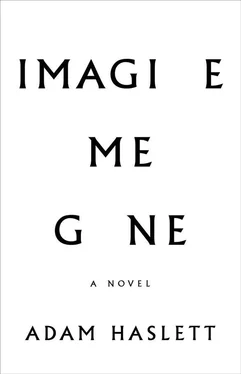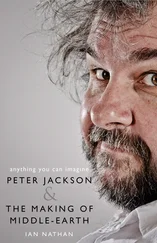“I have to go out there,” he said. “I have to see her. I could fly to Cleveland tomorrow. She’s just saying we can’t talk because her parents are telling her to. If I see her, it’ll be okay.”
On his lap he held open a half sheet of wrinkled notepaper.
“What’s that?” I asked.
“It’s her last voice mail to me before she left. I transcribed it. Do you want to hear it?”
“No, I don’t.”
“Why not?”
Beneath his guilelessness, knowingly or not, lay the accusation that if I didn’t listen I too would be abandoning him. This was the disavowal: he could remain innocent of his rage as long as he found a way, however indirect, to channel it through us. “Because you’re fixated,” I said. “You don’t talk about anything else. She’s immature. She manipulates you. I get that you’re upset. But you can’t give your whole life over to her.”
“I can’t help it, I have no choice.”
I could have argued the impossibility of the fantasy, but then out would come the Proust quotes and the diatribes against passionless domesticity. Love was an affliction or nothing at all. In which case, Paul and I were nothing. I had given up years ago on being able to share with Michael what I myself went through day to day trying to be with another person, to ease my flinching against Paul’s expressions of love, convinced that what they promised would never last, would vanish without warning and cut me back down to the truth of loneliness. Telling Michael I was pregnant and uncertain what to do? Forget it. His fumbling, anxious response would be worse than his continued ignorance, and would only require me to assure him that I was okay.
He went on about Cleveland, not quite as if I hadn’t spoken, but as if it made no difference, talking as much to himself as to me about how he could get a cab at the airport that would take him to a motel, and how from there he could take a bus to wherever Bethany eventually agreed to meet him, spooling out the line of reasoning he would use to persuade her that they had to be together, that nothing else mattered. He sounded like a child insisting on the existence of an imaginary world.
This time, when he finished, or at least paused, I had nothing left in me to add.
“Everyone’s in the living room,” I said. “You should come down. We could watch a movie.”
“What if I’m alone for the rest of my life?” he asked.
I looked away, down at his feet, at his blue Converse sneakers on the old pine-green carpet. I used to come to this room sometimes, after Michael had returned to England and I was alone in the house trying to take care of Alec and my mother. It was the farthest away I could get and still be home. Michael didn’t tell me until years later about his premonition in the woods, the one that had driven him to leave. Back then it just seemed he had picked the perfect time to be gone.
I knew by training that my own estimation of how a person would end up in life wasn’t the germane thing. Besides, I didn’t know how things were going to turn out for Michael. I couldn’t predict the future. As a counselor, my job was to make room for fears to be aired, so they could dissolve. That was the professional thing to do. And the kind thing. I was closer now than ever to treating Michael that way, as a case, cutting off what remained of brother-and-sister. But I couldn’t. I couldn’t kill him like that. For his sake, and for mine.
“You’re not going to be alone,” I said. “There are lots of women who’ve been attracted to you. You’ll find someone.”
He scanned the note in his hand once more, then folded it up and slipped it into his pocket.
“We could talk about it — at our appointment,” I said. “It might be good for all of us.”
He seemed to brighten slightly at the idea. “That would be okay?” he asked.
“It’s whatever we want it to be. Each of us.”
“Oh,” he said, “okay.” He reached for his beer on the bedside table. “Thanks for coming up,” he said.
In the living room, Alec was watching a rerun of Brideshead Revisited . A young Jeremy Irons ate strawberries under a tree with a blond aristocrat. Mom looked up now and then from her crossword to see how far along the story had progressed. Her gift to her sister this year had been a volume of the Mitford sisters’ correspondence, which Aunt Penny perused now by the fire, her legs covered by a blanket. Paul, slouching on the sofa, was still trekking through his Dostoyevsky, the book in one hand, a glass of Scotch in the other.
The family at its leisure.
“Is he all right?” Mom asked, adding without waiting for an answer, “I’m so glad you talked with him. It’s all so unpleasant.”
“He’s not great,” I said.
“Is this the Indian girl?” Aunt Penny asked.
“No,” Alec said, louder than necessary, and without turning from the screen. “She’s African-American and has borderline personality disorder.”
“Oh, come on now, who said that?” Mom asked.
“I think she did,” Alec said.
“Aren’t there any women his own age?” Aunt Penny asked. “Women he went to college with?”
“The mixer stage is over,” Alec said.
“There’s no need to be snide,” my mother said.
“I’m not. It’s over for all of us. Believe me.”
Paul laughed, but stopped short when he realized no one had joined him.
“Well,” my mother said, standing up to gather her things before going upstairs for her bath, “hopefully he’ll sleep well tonight, and be better in the morning.”
On her way out of the room, she stole a glance at her sister, and, confident she wasn’t watching, turned the thermostat ever so slightly down. I lowered myself into the armchair she’d vacated and my body collapsed into the springs.
After a few blank minutes, Aunt Penny rose as well, saying she needed to begin preparing herself for “the conditions upstairs.” She too stopped at the thermostat on the way out, turning it slightly up.
“You people are crazy,” Paul said.
“Thanks,” I replied, glad for the assist. Having made his promise earlier, he’d happily resumed his role as passive observer. Sensing my displeasure, he decided to bow out, saying he was going to read in bed and would see me shortly.
That left Alec and me sitting by the dwindling fire. He’d switched off the television and turned the wingback in toward the room again.
“How are you holding up?” he asked.
“I can’t talk to you with that mask on. It’s ridiculous.”
“You’re not allergic to the house.”
“Neither are you. Just take it off, would you?”
He lifted it onto his forehead, sniffing at the air like a badger. At least he didn’t wear Dad’s cravats anymore, like he had in high school, with the woolen pants and the cardigans, that fustian look he’d cultivated to appear more mature than he was. I could never bring myself to tell him that it just made him look gay. It would have been cruel at the time, when the clothes gave him a means to feel superior. Now he wore formfitting pullovers and aged denim, which also made him look gay, though in a more competitive vein.
“Mom’s retirement isn’t secure,” he said.
“What the fuck are you talking about? She hasn’t retired.”
“That’s not what retirement security means. What I’m saying is, she is going to retire in the next five years, and when she does, her income stream will be just enough to pay her bills, but without a cushion. And she’ll still be paying a mortgage. That is an insecure retirement.”
“I can’t talk about this. I just can’t.”
“Which allies you with her, because that’s exactly what she says when I bring it up. It’s like no one wants to even acknowledge the future. Which leaves me to worry about it.”
Читать дальше












